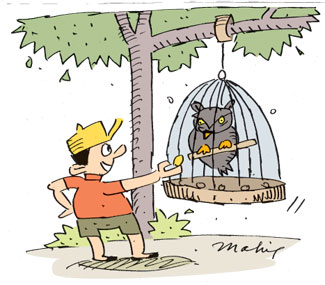|

More about ‘a’
and ‘an’
We normally use ‘a’ or ‘an’ with singular countable nouns.
The company has recruited a secretary.
Lalith has passed out as an engineer.
A notorious criminal has been arrested.
|

Jaya keeps an owl as a pet. |
Mala takes an umbrella wherever she goes.
An apple a day keeps the doctor away.
We use ‘a’ or ‘an’ to talk about one person or thing.
There is a trouble maker in every workplace.
Nimal is married to a lawyer.
They are still living in an old house.
A police car is following us.
Jaya keeps an owl as a pet.
‘A’ or ‘an’ can be used to define or classify people and things.
Hemal is an accountant.
Rajmi is looking forward to being a mother-in-law.
A trishaw is a small vehicle with three wheels.
A mother is a woman who has given birth to a child.
A king is the most powerful person in his country.
We use ‘a’ or ‘an’ in descriptions.
Amal is an honest person.
Sujatha is a kind woman who would help anyone.
We spent a lovely evening in an island.
He has a cunning look.
It’s an extremely hot day.
We do not leave out ‘a’ or ‘an’ in negative expressions.
I haven’t got a radio.
You mustn’t come to the class without a pen.
I can’t paint without a brush.
It’s about to rain. Don’t go without an umbrella.
You can’t make an omelette without eggs.
The choice between ‘a’ and ‘an’ depends on how we pronounce a word, not
spelling. We use
‘an’ before a vowel sound even if it is written as a consonant.
She spent an hour at the dispensary.
“I want to become an MP”, the child said.
We use ‘a’ before a consonant sound, even if it is written as a vowel.
The police arrested a university student.
Can you give me a one rupee coin?
Jaya was a union leader.
Some people used to say ‘an’, not ‘a’ before words beginning with ‘h’ if
the first syllable is unstressed.
They stayed in an hotel.
It was an historic occasion.
In modern English, however, we do not follow that rule and say:
They stayed in a hotel.
It was a historic occasion.
‘A’ or ‘an’ is not used with plural nouns and uncountable nouns.
There are dogs in every city.
Doctors and nurses work long hours.
|

This table is made of wood. |
This table is made of wood.
Some people have big ears.
I need information not advice.
We do not use ‘a’ or ‘an’ with weather or languages.
We experience terrible weather.
Don’t go out in rainy weather.
Kelum speaks good English.
Shyama used Hindi beautifully.We use ‘the’ when the subject is known to
the speaker and the
listener.
How are the children getting on?
Can you pass the salt?
When we speak generally, we do not use articles.
Dogs are faithful to man.
Do you like music?
Cats catch mice.
Cows give us milk.
Elephants are very big animals.
Modern English
usage
Being a living language, English is subject to change from time to
time. Here’s help for you to keep in touch with the latest trends in the
English language.
1. ex - is a prefix meaning ‘former’ The ex-US President Bill Clinton
is taking an active interest in social service. Ex-directory is used to
mean ‘not listed’ in the telephone directory’. If you receive nuisance
calls regularly, you can have an ex-directory number.
2. Exaggerate means ‘to describe as being larger, greater than is the
case’. Do not exaggerate how poor you are. Note the double ‘g’ and the
single ‘r’.
3. Exceedingly and excessively.
Exceedingly means ‘extremely’.
Elizabeth Taylor was exceedingly beautiful. Excessively means ‘beyond
measure’.
Mary is excessively fond of chocolate.
4. Except and except for
Except is more usual than except for. Many people died during the
tsunami except animals. We use except for at the beginning of a
sentence. Except for the foreman, all the workers went on strike.
5. Exceptional and exceptionable
Exceptional means ‘unusually good’.
The City Hotel serves exceptional food and drink. Exceptionable
‘describes something someone might object to’. The director found the
new recruit’s behaviour exceptionable.
6. Exercise and exorcise
Exercise usually means ‘physical exertion’. He does exercises early
in the morning. Exorcise means ‘to rid of evil spirits’. They are
looking for someone to exorcise their haunted house.
7. Exhaustive and exhausting
Both words are formed from the verb ‘exhaust’. Exhaustive means
‘comprehensive’. The detective made an exhaustive search for the weapon
used in the murder. Exhausting means ‘extremely tiring’. I had an
exhausting day at the training camp.
Expeditious and expedient
Expeditious means ‘rapid’. Send me the book by the most expeditious
method. Expedient means ‘most convenient’. The government is taking
politically expedient measures to solve the university problem.
9. Explicit and implicit
Explicit means ‘direct or clear’. He gave me explicit instructions on
how to do it. Implicit means ‘implied’. We have implicit faith in some
people.
10. Extinct and extant are opposites. Extinct means ‘no longer in
existence’. Dinosaurs have been extinct for millions of years. Extant
means ‘still in existence’. Some New Year customs are still extant in
Sri Lanka.
Starters:
What are
adverbs?
Adverbs are words which tell more about verbs, adjectives or other
adverbs.
They are usually placed next to the words they describe.
Most adverbs are formed by adding 'ly' to adjectives.
|

Sarath climbed the mango tree quickly. |
Listen carefully to what I say. (adjective: careful)
The explorers climbed the mountain quickly. (adjective: quick)
The beggar ate the plate of rice hungrily. (adjective: hungry)
It started raining heavily when we reached Kandy. (adjective: heavy)
The bhikkhu walked silently begging for food.(Adjdctive:silent)
However, some adverbs do not take the 'ly' ending. They have the same
form as adjectives.
"I cannot walk far," the child said.
Are you going to stay long in the island?
Do you know that crabs cannot walk straight?
Padma spoke last.
My father works hard.
When the sentence has an object the adverb cannot be placed between the
verb and the object.
Quickly Sarath climbed the mango tree. (Adverb at the beginning).
Sarath climbed the mango tree quickly. (Adverb at the end)
Sarath quickly climbed the tree. (Adverb between the subject and the
verb)
Activity
Underline the adverbs in the following sentences. Check your answers
with the key.
1. Asiri drove carefully along the narrow road.
2. I didn't go to school because it was raining heavily.
3. The teacher asked me to speak quietly.
4. She was crying because she did badly in the exam.
5. Father never takes me seriously.
6. Thamara speaks English perfectly.
7. Gwen looked at the injured dog sadly.
8. Oh, I'm terribly sorry.
9. It's a reasonably cheap hotel.
10. Thompson wrote the essay incredibly quickly.
11. The examination was surprisingly easy.
12. Ten people were seriously injured.
13. The contest was badly organised.
14. She found a job easily.
15. The principal arrived unexpectedly.
Key
1. carefully
2. heavily
3. quietly
4. badly
5. seriously
6. perfectly
7. sadly
8. terribly
9. reasonably
10. incredibly
11. surprisingly
12. seriously
13. badly
14. easily
15. unexpectedly |

